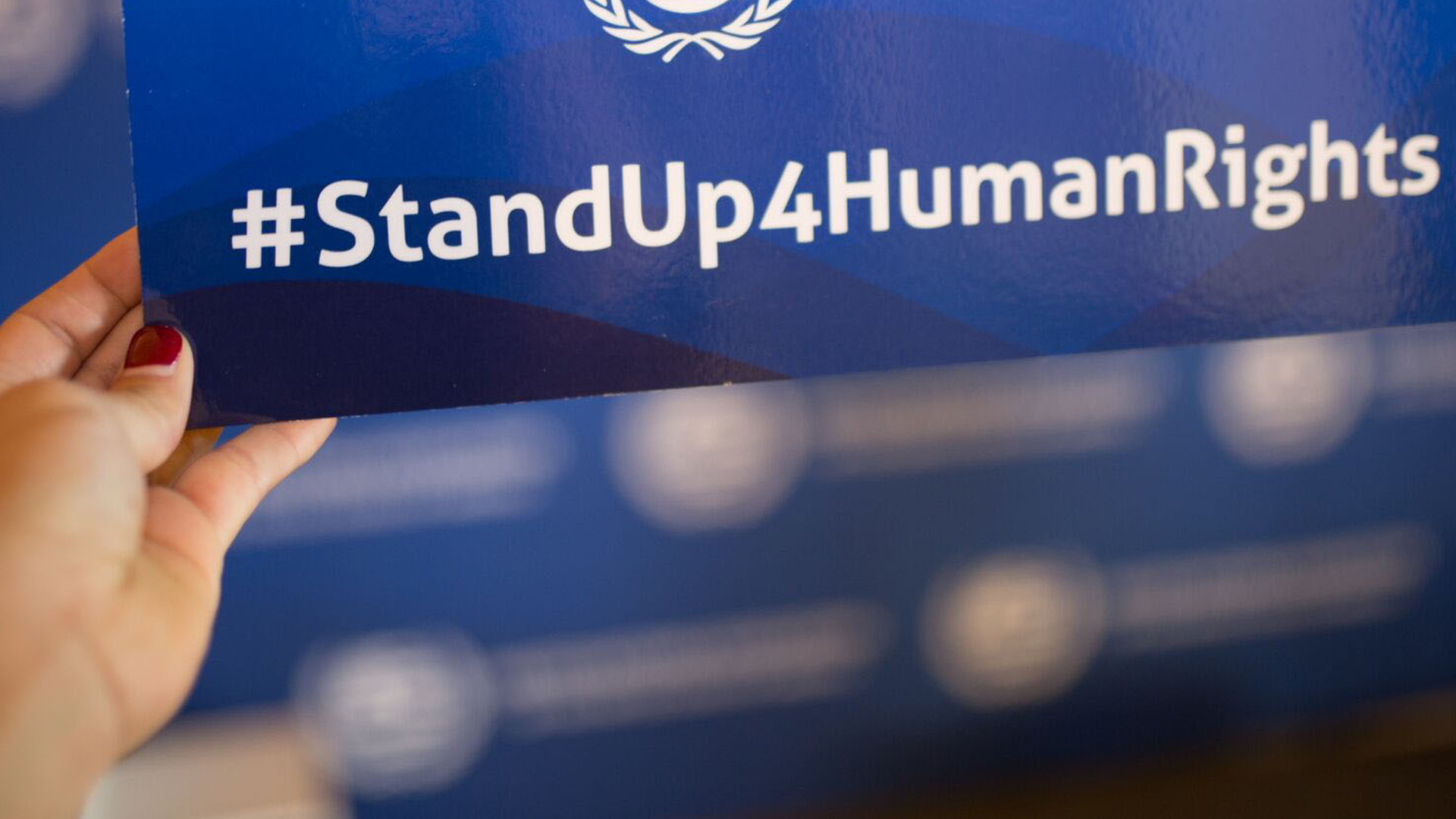Highlights from the Los Angeles Youth Solutions Summit
Universal Human Rights are often at the forefront of many high level UN discussions. At the UN Human Rights Council in Geneva, topics such as advancing gender equality and LGBTI inclusion are just a few of many pressing issues on the table each day. However, UN officials aren’t the world’s only trailblazers in the fight for universal human rights. In local communities here in the U.S. and across the globe, change-makers of all backgrounds, beliefs, and ages are confronting tough human rights challenges and offering creative solutions to resolve them. Throughout the past year, I had the chance to see some of those change-makers up close.
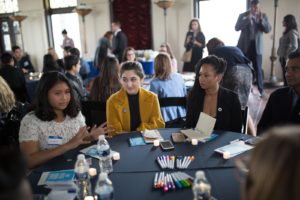
On December 10, 2018, the UN celebrated the 70th anniversary of the Universal Declaration of Human Rights (UDHR), a document that is widely considered the “moral charter of the United Nations.” This milestone anniversary gave Americans across the country an opportunity to take the UDHR’s founding principles and turn them into action.
So what does protecting human rights look like in action? Let’s get down to the details:
All throughout 2018, UNA-USA leveraged support for the UDHR through its network of over 20,000 members across the country. On Human Rights Day, I had the opportunity to zoom in on my hometown of Los Angeles to see firsthand how young people are spearheading creative solutions for incomprehensible challenges facing the city that raised me. In partnership with the United Nations Human Rights Office and the Office of Los Angeles Mayor, Eric Garcetti, UNA-USA hosted its first ever Youth Solutions Summit at LA City Hall to give these young voices a platform for purpose.
Why is this significant? Here are 3 key takeaways:
A Unique Youth Moment
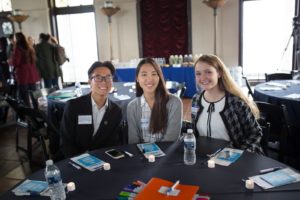 Youth empowerment was the driving force behind the Youth Solutions Summit. Human rights solutions were garnered by student leaders who presented their ideas to a panel of global and local change-makers, including: Jason Collins, Monique Coleman, Dolores Huerta and more. It was a unique opportunity for youth from all over Los Angeles to share their ideas, receive valued feedback, and take action for human rights.
Youth empowerment was the driving force behind the Youth Solutions Summit. Human rights solutions were garnered by student leaders who presented their ideas to a panel of global and local change-makers, including: Jason Collins, Monique Coleman, Dolores Huerta and more. It was a unique opportunity for youth from all over Los Angeles to share their ideas, receive valued feedback, and take action for human rights.
Human Rights Close to Home
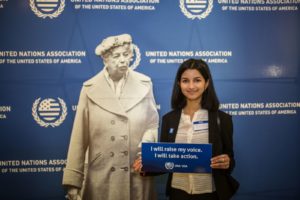 Topics addressed by student leaders at the Summit included LGBTI equality, gender equality, homelessness, immigration, and technology for social good. These five core issue areas were identified by young Angelenos based on their relevance to the Los Angeles community, and to remind us of Eleanor Roosevelt’s famous advice, “Where, after all, do universal human rights begin? In small places, close to home.” Here are some highlights that were presented by youth activists in Los Angeles:
Topics addressed by student leaders at the Summit included LGBTI equality, gender equality, homelessness, immigration, and technology for social good. These five core issue areas were identified by young Angelenos based on their relevance to the Los Angeles community, and to remind us of Eleanor Roosevelt’s famous advice, “Where, after all, do universal human rights begin? In small places, close to home.” Here are some highlights that were presented by youth activists in Los Angeles:
- Gender Equality – Sophia Rubbo: Junior at Westridge School for Girls – “The unique struggles that women face around the world is apparent. We must work to increase economic autonomy for low income immigrant women, create greater educational opportunities for women and girls and foster greater discussion for issues regarding gender.”
- Homelessness – Leo Tafoya: Senior at California Academy of Mathematics – “America’s ‘invisible’ population experiences utter neglect and lack basic rights that should be guaranteed to every human. Other than providing a simple soup kitchen, the Los Angeles community should be working together to establish hybrid homeless facilities that tackle multiple issues, such as mental health and drug addiction under one roof”
- Technology for Social Good – Kavita Rai: Senior at Newbury Park High School – “Social media platforms, such as Snapchat, should use their location-based maps to help advance social good. Instead of using maps to simply track one’s location, each map should be customized to connect people, such as refugees and asylum seekers, and alert communities when others are in danger.”
- Immigration – Angela Zhang: Sophomore at Geffen Academy at UCLA – “Americans must seek to understand the importance of immigration to broaden our cultural lense. Immigrants face mental and emotional barriers that make it challenging to live each and everyday. As young activists, we must make effort to break the ‘wall of fear’ that is inflicted on immigrant communities.”
- LGBTQI Equality – Thomas Chung: Senior at Gabrielino High School – “Youth should use their passion to create change, even if that means defying the norm and breaking expectations. We must advocate for our LGBTQI peers in our classrooms, on social media, and on the streets when we see anyone’s human rights being challenged.”
“Shine Your Light” for Human Rights
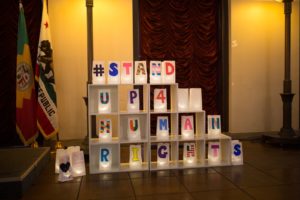 In an effort to visually symbolize the impact of the Youth Solutions Summit, students were asked to artistically display how they will take action for the UDHR in their community by decorating their very own luminescent candle bag. The glow from each unique lighted bag represented a collection of individual ideas, connections and emotions that motivate young people to stand up for human rights in their communities and beyond. During the event, a sea of small candles illuminated City Hall at dusk, representing hope that every effort—no matter how small—will help shine a light on human rights for everyone, everywhere.
In an effort to visually symbolize the impact of the Youth Solutions Summit, students were asked to artistically display how they will take action for the UDHR in their community by decorating their very own luminescent candle bag. The glow from each unique lighted bag represented a collection of individual ideas, connections and emotions that motivate young people to stand up for human rights in their communities and beyond. During the event, a sea of small candles illuminated City Hall at dusk, representing hope that every effort—no matter how small—will help shine a light on human rights for everyone, everywhere.
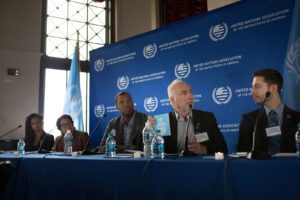
In an era where human rights are being challenged in every corner of the globe, 2018 was a year for reflection and empowerment alike. By listening to the brave voices of young advocates, I realized the aspirations behind the UDHR cannot be advanced unless we put our voices and our values behind them. Americans—especially young American—realize this. Today, youth leadership is a beacon of hope for a brighter future—and the future is in good hands.
Check out our highlights from the Los Angeles Youth Engagement Summit:


